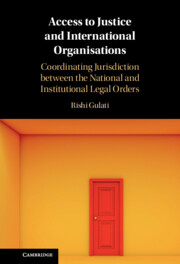 Access to Justice and International Organisations
Access to Justice and International Organisations Book contents
- Access to Justice and International Organisations
- Access to Justice and International Organisations
- Copyright page
- Contents
- Acknowledgements
- Abbreviations
- Introduction
- 1 International Organisations and Their Access to Justice Obligation
- 2 The Criteria for Assessing the Appropriateness of Dispute Resolution Mechanisms at International Organisations
- 3 Assessing Dispute Resolution Mechanisms at International Organisations
- 4 The Nature of Institutional Immunities
- 5 Realising Access to Justice in Claims against International Organisations
- Conclusion
2 - The Criteria for Assessing the Appropriateness of Dispute Resolution Mechanisms at International Organisations
Published online by Cambridge University Press: 10 March 2022
- Access to Justice and International Organisations
- Access to Justice and International Organisations
- Copyright page
- Contents
- Acknowledgements
- Abbreviations
- Introduction
- 1 International Organisations and Their Access to Justice Obligation
- 2 The Criteria for Assessing the Appropriateness of Dispute Resolution Mechanisms at International Organisations
- 3 Assessing Dispute Resolution Mechanisms at International Organisations
- 4 The Nature of Institutional Immunities
- 5 Realising Access to Justice in Claims against International Organisations
- Conclusion
Summary
This chapter develops the criteria relevant to assess a dispute resolution mechanism or DRM’s compliance with fair trial standards. The discussion focuses on the three broad fair trial guarantees that an institutional DRM must incorporate if it is to be considered appropriate. These are independence, impartiality and fairness. First, the discussion shows that for a DRM to be considered independent, it must possess institutional, decisional and personal/individual independence. Those three aspects will be explained succinctly. The chapter then focuses on the concept of judicial impartiality. For a fair trial to be provided, impartiality in its objective and subjective sense is critical. Finally, the chapter demonstrates how the right to a fair trial also demands that a claimant is treated fairly. Fairness is a broad guarantee and is explored through seven sub-component fair trial rights. Fairness cannot be achieved unless the right to equal access to the courts, the right to equality of arms, the right to an oral hearing, the right to appeal, the right to a reasoned judgment, the right to access justice without undue delay and the right to an effective remedy are provided for in the law, and importantly, practically realised.
Keywords
- Type
- Chapter
- Information
- Access to Justice and International OrganisationsCoordinating Jurisdiction between the National and Institutional Legal Orders, pp. 39 - 69Publisher: Cambridge University PressPrint publication year: 2022
